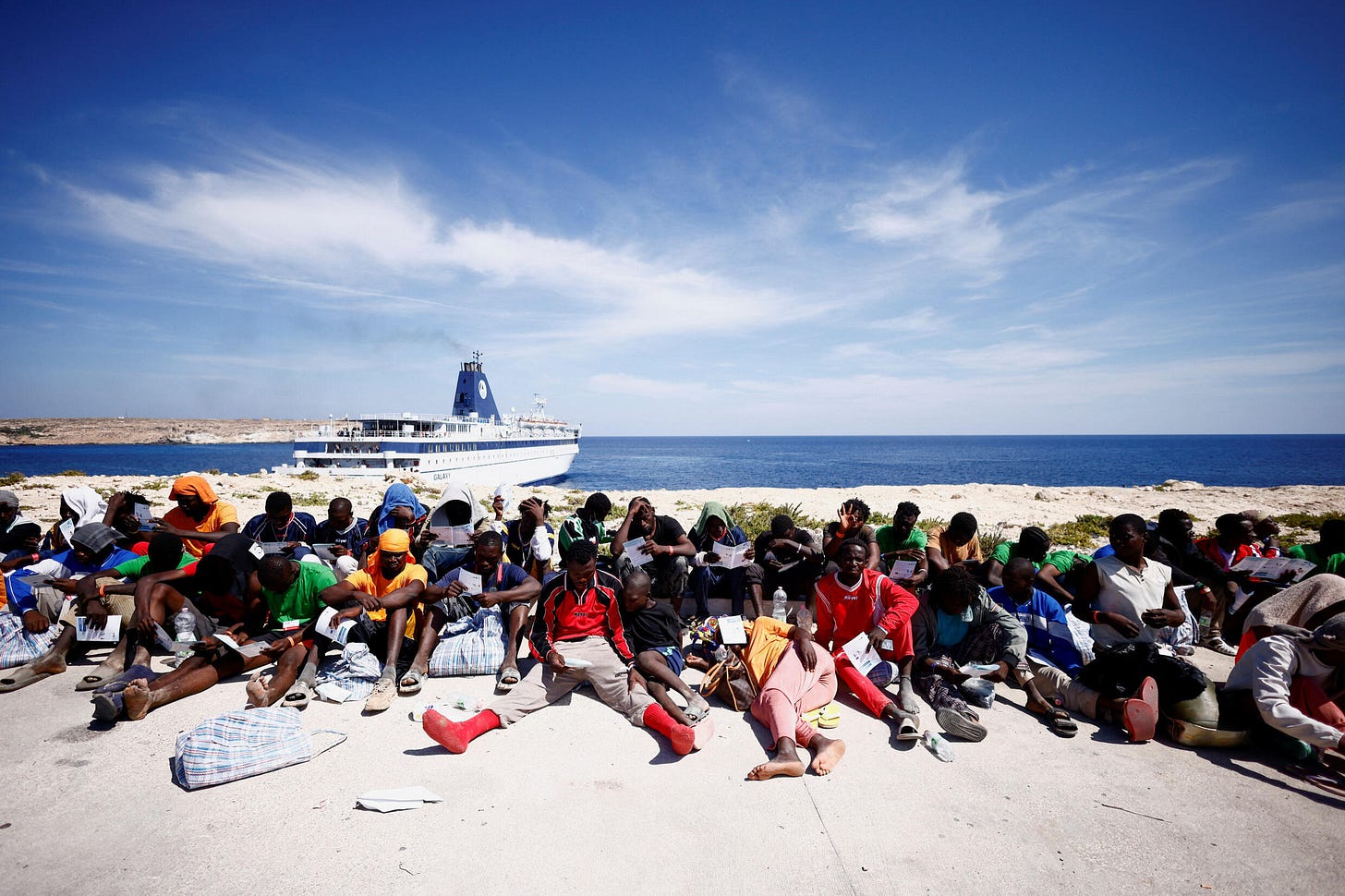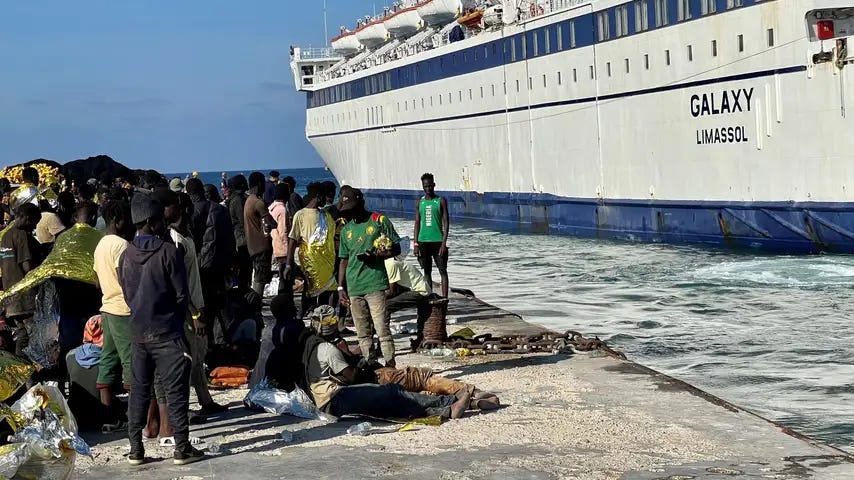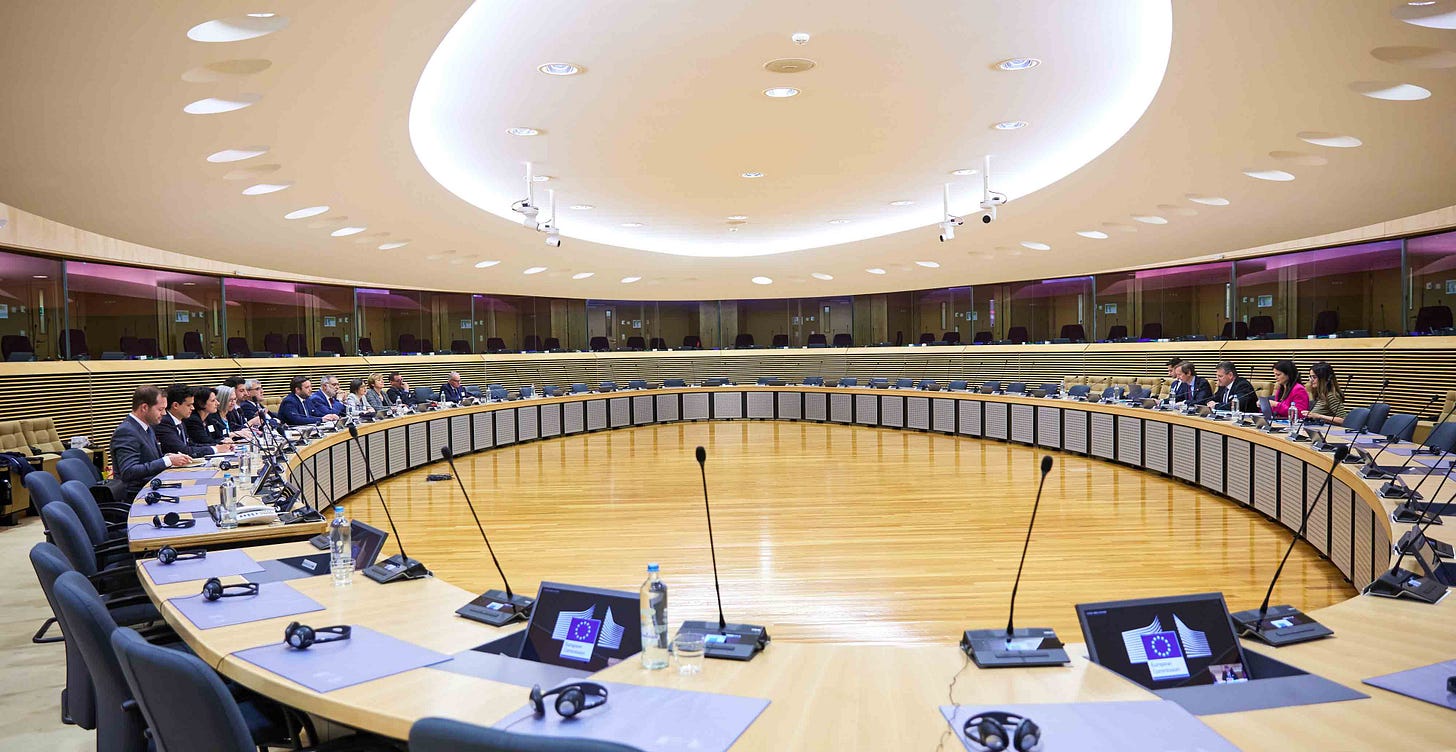Submerged In A Migration Tsunami, An Italian Island Copes With The Failures Of Globalism
The turbulent and chaotic processing center on Lampedusa offers an insight as to what awaits Europe if growing migration trends are not taken seriously by political leaders.
With a population of 6,500, Lampedusa is a small, Italian island in the Mediterranean. Devoid of any large businesses or industries, the economy is largely dependent on fishing. For all intents and purposes, Lampedusa should be irrelevant. However, due to its central location as a stepping stone for Europe, the island and its community have found itself thrust to the frontier of Europe’s war with immigration from North Africa and the Middle East.
While this is nothing new for Lampedusa - the island has been a major processing center since 2011, following the Arab Spring - the intensity of the situation has worsened in recent weeks. On the 13th of September, around 7,000 people - equivalent to the entire local population - arrived in the port, overwhelming volunteer groups and pushing the processing site to a breaking point, with humanitarian organisations reporting a lack of water, food and medical care. Desperate to find new life in Europe, clashes broke out between migrants stationed at the Favaloro pier and the police forces tasked with controlling the area, resulting in dozens of injuries.
Lampedusa’s mayor, Filippo Mannino, took to the airwaves, pleading on Italian radio for more help and assistance from the Italian and other European governments. “We have now reached a point of no return and the island is in crisis. Europe and the Italian state must step in immediately with a rapid support operation and swift transfer of people."
In response, the European Commission said it was in touch with the Italian government to discuss the possibility of offering more help for Lampedusa. "We stand ready to support Italy and this is what we are doing," a Commission spokesperson said.
Almost 124,000 migrants have arrived on Italy's shores so far this year, up from 65,500 in the same period last year. Although Meloni’s government has rolled out policies intended to curb immigration - restricting the activities of charity rescue boats, impounding their vessels, banning them from conducting multiple rescues and making them travel longer distances to disembark migrants - the trend shows no sign of slowing down. Matteo Villa, a migration data analysis expert from the ISPI think tank in Milan, reported that migrant arrivals to Italy this year are close to the record registered in 2016, when more than 180,000 people came.
This new wave of migration is not just limited to Lampedusa, however. Preliminary data from Spain, another country on the EU's southern flank, showed the number of migrant arrivals to the Canary Islands more than trebled to 2,891 people in the first two weeks of September. Instability in Libya and Morrocco, exacerbated by recent environmental disasters, is fueling this increase, argue leading migrant specialists.
Threatened with growing ecological disasters, this uptick only looks like a prelude to a much greater migration shift. As temperatures rise along the Equator and the process of desertification continues unabated, living in North Africa will soon prove impossible, sparking an exodus of millions of people. And Europe’s relative stability, both economically and geographically, will be the main allure.
The pivotal question is, faced with this growing threat, how will European governments make sure that the failures of 2015, when 1.5M migrants flooded into Europe, are not repeated. Back then, mass immigration fueled social unrest, leading to a spike in criminal activity as unemployed men joined criminal organisations for work, and burdened local services from the increase in demand.
Attempts to stem this tide have proved fruitless, with the EU’s latest effort, a collaboration with Tunisia to halt the source of this migration, falling apart months after the treaty was signed. Instead of proposing solutions as to how to combat this trend, the EU seems largely apathetic. 2016 talking points about redistributing rather than preventing them to come in the first place is still dominant in the European parliament. Even something as mild as pushbacks has received enormous opposition, proving, once again, that Brussels is hopelessly out of touch with the people it claims to represent.
According to recent polling, most Europeans view reducing immigration back to sustainable levels as a number one priority. This has been reflected in the rise of far-right parties across the continent, which have centered anti-immigration rhetoric at the heart of their platforms. In Germany, AfD is in a steady 2nd place with around 21-23%; France’s National Rally regularly tops election polls; Meloni’s right-wing Brothers of Italy, alongside its right-wing allies, maintains majority support in polls; and countries which never had far-right support, like Romania and Portugal, now see it gathering momentum there.
Europe is capable of reacting appropriately to this. Most nations are capable, if the will to act exists. Nations with armies, police, bureaucracies, and the rule of law can handle disorganized migrants fairly easily- unless they choose not to. So far, European governments have taken the ‘aid approach’, pouring resources and funds into welfare benefits. Though this may seem like the humane approach, it only incentivises further migration. A cultural shift is thus necessary.
With an issue this complicated, there is no easy solution; however, European governments should start by discarding the suffocating, archaic legal orthodoxy which restricts efforts to repel the migrants. Too many international treaties, such as the 1951 UN Refugee Convention, offer loopholes to be exploited and are the main reason why local forces are unable to adequately deal with the situation unfolding on their shores. Replacing these with a new, flexible legal doctrine is an upmost priority.
Furthermore, the NGOs aiding these efforts, by transporting migrants across the Mediterranean, should also be closed down, their funders and workers arrested for conspiring against Europe. Ships used in the trafficking should be impounded, and ports barred from offering sanctuary. Migrants should also be deported back to their place of origin. Overall, the very attitude of Europe and its institutions towards the migrants should switch from an open embrace to a stern dismissal. The continent as a whole does not owe an obligation to these people. If they are met with a hostile environment, fewer migrants will feel emboldened to make the voyage.
Europe should also begin labelling these people what they are - invaders. Though it might seem like a semantic issue, accurately describing this group goes a long way in shaping the discourse around the problem. ‘Migrants’ evokes a feeling of passivity while ‘invaders’ conjures up a sense of urgency, one that might spur more people into action.
While Lampedusa is a small island, the turmoil unfolding on its shores offers a microcosm of a much wider issue – a local community overwhelmed by a problem it did not ask for, as its leaders and politicians look on with apathy. This is not sustainable; eventually it will spill in blood, either in the streets or in the Mediterranean. The clock is ticking.




